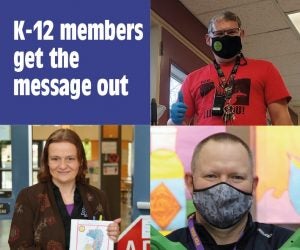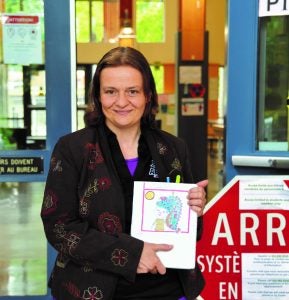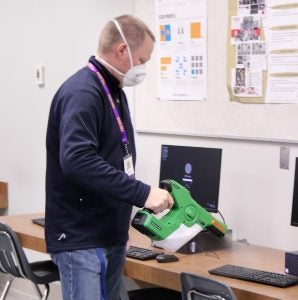 Troy Tardiff
Troy Tardiff
CUPE 1851 custodian
Custodian Troy Tardiff has always loved working with people. He was a cleaning supervisor in a hospital before coming to K-12. Now at Shortreed Community School in Langley, Tardiff was featured in the Langley Advance Times.
His dedication, relationship with students and concern for others shine through.
“Kids are amazing,” says Tardiff.
Patricia Richetto
CUPE 4227 education assistant
EA Patricia Richetto overcame pandemic stress and negativity by remaining positive, embracing technology, and through art. Before COVID she didn’t own a computer! But like many K-12 support staff, she learned Zoom and other programs to connect with students online.
Richetto is featured in Counterpoint, CUPE’s national quarterly newsletter.
“I’m very happy to be back and working with students,” she said.
John Johnson
CUPE 523 custodian
The Penticton Herald chose CUPE 523 custodian John Johnson to represent 2020 newsmaker of the year – frontline workers, as selected by readers.
Johnson used to work evenings in a middle school but was moved to day shift because of the pandemic.
“Moving to day shift connected me more to the staff, the building and the students in it,” said Johnson.
Our key messages
As we continue to face COVID-19 together and begin to prepare for collective bargaining next year, we will have many opportunities to reach our members, employers, K-12 partners and the public. We need to let everybody know who we are and that our work is crucial to education. It benefits our families and communities
Whether it comes from CUPE Locals, members, staff or elected officials, we need to deliver a consistent message using social media and other forms of communication.
As well as sharing our message widely with members, we will be reaching out to the public with earned media (letters to the editor and opinion columns) in major and community newspapers. Stay tuned.
CUPE continues to call for increased transparency and timeliness of COVID-19 exposure notifications.
Safe schools are clean schools. We need permanent daytime custodians. Safety plans must be followed to keep schools open.
School districts must support isolation and/or quarantine by continuing wages and benefits to members.
View PDF.

 NORTH VANCOUVER—Before COVID-19 hit, Patricia Richetto had worked at École André-Piolat for 14 years. It was her comfort zone. The life-changing pandemic brought negativity and stress, but she not only coped, she conquered.
NORTH VANCOUVER—Before COVID-19 hit, Patricia Richetto had worked at École André-Piolat for 14 years. It was her comfort zone. The life-changing pandemic brought negativity and stress, but she not only coped, she conquered. LANGLEY—CUPE 1851 member Troy Tardiff, a custodian at Shortreed Community School in Langley, has always loved working with people. Tardiff was featured recently in a
LANGLEY—CUPE 1851 member Troy Tardiff, a custodian at Shortreed Community School in Langley, has always loved working with people. Tardiff was featured recently in a  PENTICTON—CUPE 523 member John Johnson, a custodian at Penticton High School (PenHi), was selected by the
PENTICTON—CUPE 523 member John Johnson, a custodian at Penticton High School (PenHi), was selected by the